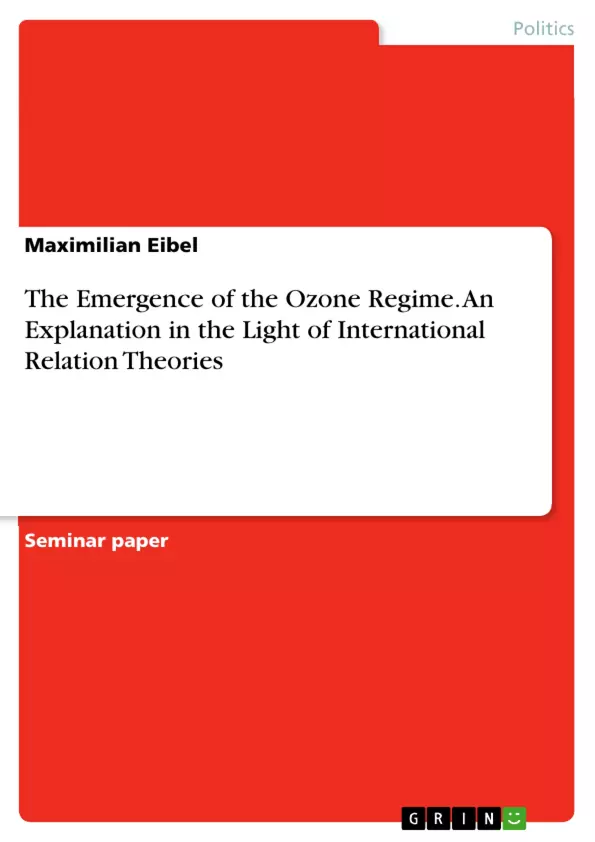This paper analyses why all of the major ODC-producing countries, as well as several developing countries dependent on ODCs for domestic development, “decided to sign the treaty after many had opposed a regulatory ozone treaty for over a decade”. Because the United States (US) and the member states of the European Community (EC) had seemingly irreconcilable differences at the beginning of the negotiations, I will focus on these two major actors. While acknowledging that Japan and the former Soviet Union played also a crucial role.
This paper tries to explain the emergence of the ozone regime by using the neoliberalism and neorealism theory of international relations. The key variable for explaining the emergence of the ozone regime is interest in neoliberal terms and power in the neorealist school. Due to the fact that three schools of thought have shaped the discussion of regimes, I will also examine the constructivist approach to explain the ozone regime formation, because the other approaches neglect the influence of causal and social knowledge for the decision making of actors.
Inhaltsverzeichnis (Table of Contents)
- Introduction
- Historical evolution of the stratospheric ozone regime
- Problem of the stratospheric ozone depletion
- Regime formation
- The ozone regime
- The neorealist approach
- State coordination for the ozone regime formation in terms of neo-realism
- The neoliberal approach
- How the neoliberal approach explains the emergence of the ozone regime
- The free-riding problem
- The constructivist approach
- The ozone regime explained in terms of the weak cognitive approach
- Conclusion
Zielsetzung und Themenschwerpunkte (Objectives and Key Themes)
This paper examines the emergence of the ozone regime, focusing on the Montreal Protocol and its effectiveness in addressing the problem of stratospheric ozone depletion. The analysis explores various theoretical frameworks, including neorealism, neoliberalism, and constructivism, to explain the regime formation and the cooperation among nations despite differing national interests.
- The historical evolution of the ozone regime and the emergence of the Montreal Protocol
- The role of different theoretical approaches, particularly neorealism, neoliberalism, and constructivism, in explaining the emergence and success of the ozone regime
- The challenges of international cooperation in addressing global environmental issues
- The impact of scientific knowledge and evidence on policy decisions
- The importance of international regimes in overcoming the problem of anarchy in the international system
Zusammenfassung der Kapitel (Chapter Summaries)
The introduction outlines the problem of ozone depletion and the importance of the Montreal Protocol as an international environmental regime. The paper then explores the historical evolution of the ozone regime, highlighting key events and actors involved in the negotiation process leading to the Vienna Convention and the Montreal Protocol.
The next section delves into theoretical frameworks that attempt to explain the emergence of the ozone regime. It examines the neorealist approach, emphasizing the role of power and state interests, and the neoliberal approach, focusing on the importance of cooperation and shared interests in overcoming collective action problems. The paper then explores the constructivist perspective, considering the influence of knowledge and social norms on decision-making processes.
Schlüsselwörter (Keywords)
The primary focus of this paper lies on the emergence and effectiveness of the ozone regime, specifically the Montreal Protocol. The analysis examines the interplay of power, interests, and knowledge in international relations, considering the perspectives of neorealism, neoliberalism, and constructivism. Important terms include ozone depletion, international environmental regimes, global ecological problems, state cooperation, and the theoretical frameworks of neorealism, neoliberalism, and constructivism.
Frequently Asked Questions
What is the main objective of the paper on the ozone regime?
The paper analyzes why major ODC-producing countries agreed to sign the Montreal Protocol despite long-standing opposition to regulatory treaties.
Which theoretical frameworks are used to explain the ozone regime?
The analysis utilizes neorealism, neoliberalism, and constructivism to explain international cooperation and regime formation.
What is the key variable in neorealism for this study?
In neorealist terms, the key variable is power and state coordination based on national interests.
How does the constructivist approach contribute to the explanation?
Constructivism examines the influence of causal and social knowledge on decision-making, which other theories often neglect.
What was the "free-riding problem" mentioned in the paper?
It refers to the neoliberal challenge where states might benefit from ozone protection without incurring the costs of reducing their own ODC production.
Who were the major actors in the ozone negotiations?
The United States and the European Community were the central actors, with Japan and the former Soviet Union also playing crucial roles.
- Quote paper
- Maximilian Eibel (Author), 2012, The Emergence of the Ozone Regime. An Explanation in the Light of International Relation Theories, Munich, GRIN Verlag, https://www.grin.com/document/298305



